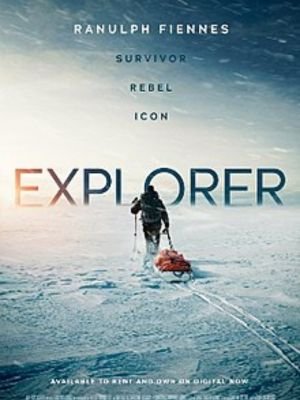
Matthew Dyas’ film about Ranulph Twisleton-Wykeham-Fiennes, The World’s Greatest Living Explorer™, is a non-fiction Fitzcarraldo. Like Klaus Kinski’s mad-eyed visionary, Fiennes shows that dreamers can move mountains with willpower alone – and bloody-mindedness and ingenuity. Natural history filmmaker Dyas etches Fiennes’ story briskly with archive footage and disembodied voices, but cuts it together with footage of Fiennes today. So Explorer is an enjoyable potted CV of a fantastic – almost unbelievable – life, but scored by human moments and an undertow of sadness.
The dramatic peaks of this eventful life are a documentarian’s delight: chucked out of the SAS after blowing up the set of Rex Harrison Doctor Doolittle; ran night raids for the sultanate of Oman; crossed both poles; completed seven marathons on seven continents in seven days (four months after suffering a heart attack); became the oldest Briton to scale Everest. The film does not stint on sensational details — on one expedition he lost the tips of four fingers — but also astutely shows how Fiennes knows people think about him. During Transglobe Pole to Pole pre-publicity he tells his team to dial down their public-school backgrounds. “White-privilege folly” is invoked, but not engaged with.
Even around these peaks there are lots of stories —he got down to last six to play James Bond when Roger Moore was cast — and they are told in broad, colourful strokes. But what hits harder is the portrait of his 48-year relationship with childhood sweetheart Ginny — he used to leave secret love letters for her in a tree trunk — who became his driving force until she died from cancer. He admits it’s “the only topic that makes me emotional”, and Fiennes coming to terms with her absence is undeniably moving given his usual stoicism. Also touching is the snapshot of Fiennes today, driving up and down the country to do personal appearances as a means to “pay the gas bills”, sleeping in his battered-up car in-between signings, asking director Dyas what the word “woke” means and just frustrated with what his body and health can’t do any more (as a jogger runs by, he mutters: “Those were the days”).
Dyas’ filmmaking is artful – particularly in the early scenes – using creative sound design (although it’s sometimes hard to keep track of all the disconnected voices). There’s minimal probing or insights into what makes Fiennes tick, but Explorer still stands as a compelling testament to one man’s will to push himself to his limits. And then some.
Also, Read On Fmovies
